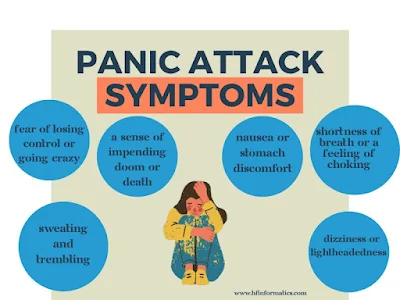How to Deal with Panic Attacks? Unmasking the Invisible Enemy
Overiew:
In our
busy world today, stress and anxiety are very common, which is why it's
important to talk about panic attacks. Many people don't fully understand panic
attacks, but they can be very difficult and overwhelming. This article will
help us learn more about panic attacks, including what causes them, what symptoms
to look out for, and how to cope with them. By sharing this information, we
hope to increase understanding and support for those who experience panic
attacks.
What is a panic attack?
Panic
attacks are when someone suddenly feels very scared and anxious, even though
there doesn't seem to be a reason for it. During a panic attack, they might
have strong physical and emotional feelings that can be overwhelming. It's
important to know that having a panic attack doesn't mean someone is weak or
has something wrong with them as a person. It's a real medical condition.
How can I recognize the symptoms?
During
a panic attack, you may experience a range of distressing symptoms, such as:
- Rapid heartbeat and chest pain
- Shortness of breath or a feeling of choking
- Dizziness or lightheadedness
- Sweating and trembling
- Nausea or stomach discomfort
- Fear of losing control or going crazy
- A sense of impending doom or death
Are panic attacks dangerous?
While
panic attacks can be distressing and overwhelming, they are not physically
dangerous. However, they can significantly impact a person's quality of life
and well-being. Seeking professional help is important to manage and overcome
panic attacks.
What are the causes of panic Attacks?
Panic
attacks can happen because of different things, like genes you inherit, bad
experiences, being under a lot of stress for a long time, or having certain
health problems. Knowing what causes panic attacks can help people and their loved
ones find ways to get better and feel more in control.
How long do panic attacks typically last?
Panic
attacks generally, reach their peak within 10 minutes and subside within 20 to
30 minutes. On the contrary, the duration can vary from person to person.
Editor's picks:
Are panic attacks a sign of a mental health disorder?
Panic
attacks can happen if someone has certain mental health problems, like panic
disorder, generalized anxiety disorder, or social anxiety disorder. But just
because someone has occasional panic attacks doesn't always mean they have a
mental health problem.
Can panic attacks be treated?
Yes,
panic attacks can be effectively treated.
Treatment
options may include therapy, including medication, cognitive-behavioral therapy
(CBT), or a combination of both. It's really important to consult with your
healthcare professional to figure out the best treatment for you.
Can panic attacks be prevented?
Although
it's not possible to completely stop panic attacks from happening, there are
some things you can do to make them happen less often and be less intense.
These include taking care of your health, exercising regularly, learning how to
manage stress, and getting help from a professional who knows how to treat
panic attacks.
How to manage and overcome the panic attack?
Living
with panic attacks can be challenging, but there are effective strategies to
manage and overcome them. Here are a few techniques that can help:
1. Deep breathing exercises:
Focusing
on slow, deep breaths can help regulate the body's response to stress and
reduce the intensity of panic attack symptoms.
2. Cognitive-behavioral therapy (CBT):
This
therapeutic approach helps individuals identify and challenge negative thought
patterns and develop healthier coping mechanisms.
3. Lifestyle modifications:
Engaging
in regular exercise, maintaining a balanced diet, and getting enough sleep can
contribute to overall well-being and reduce the frequency of panic attacks.
4. Seeking support:
Connecting
with support groups or seeking professional help can provide individuals with
the guidance and encouragement they need to navigate their journey toward
recovery.
Spreading awareness and empathy:
It is crucial to foster a supportive and understanding environment for individuals experiencing panic attacks. By educating ourselves and others about this condition, we can break the stigma surrounding mental health and create a more compassionate society.
How can I help someone experiencing a panic attack?
If you
encounter someone having a panic attack, it is important to remain calm and
supportive. Encourage them to focus on their breathing, offer reassurance, and
help them find a quiet and safe space. If the panic attack persists or worsens,
it may be necessary to seek medical assistance.
Can lifestyle changes help in managing panic attacks?
Yes, certain lifestyle changes can contribute
to managing panic attacks. These include practicing stress-reducing techniques,
such as deep breathing exercises and mindfulness, maintaining a healthy diet,
getting regular exercise, and ensuring adequate sleep.
Remember,
it is always recommended to consult with a healthcare professional for a proper
diagnosis and personalized treatment plan for panic attacks.
Conclusion:
Panic
attacks can be a terrifying and isolating experience, but with the right
support and coping strategies, individuals can regain control of their lives.
By shedding light on this often-misunderstood condition, we can foster empathy,
understanding, and support for those who face the invisible foe of panic
attacks. Let us strive to create a world where mental health is prioritized,
and no one feels alone in their battle against anxiety.
Remember,
if you or someone you know is experiencing panic attacks, it is essential to
seek professional help for an accurate diagnosis and personalized treatment
plan.





.jpg)
Post a Comment